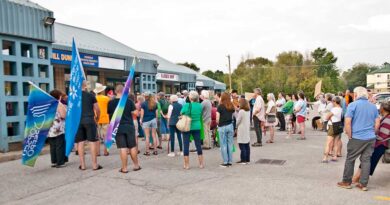Aaron Cayden Hiltz, Success Story
By John Swartz
SUNonline/Orillia profiles candidates from each party in the forthcoming provincial election. Each candidate was asked the same set of questions. All candidates were invited to participate, however Mark Douris of the New Blue Party and Jill Dunlop of the Progressive Conservative Party of Ontario did not make arrangements to meet with SUNonline/Orillia.
By John Swartz
When you learn Aaron Cayden Hiltz’s back-story you’ll be impressed with him, even if he doesn’t win this election.
“I was born at RVH and my family lived in Alcona. I grew up in a very toxic environment and I left home when I was 12. I couched surfed and I stayed with different families – I spent time as a homeless youth, but I was adopted when I was 17-year-old, right before I turned 18. My mom, who adopted me, had a farm out on Burnside line and that’s how I came into this community,” Hiltz said.
“I fell in love immediately. It’s absolutely beautiful. The beach reminded me a lot of Alcona and where I grew up. It’s been life changing.”
Running is a progression from involvement in the community.
“So the past 14 years I’ve been in this community and I’ve been working for it and I also feel this sense of debt to it. I didn’t get adopted and my life wasn’t rehabilitated through any form of government policy. I never went through the foster system. I was never helped through any programs. I was adopted and rehabilitated due to the generosity of this community.”
“My mom worked relay hard to instill certain values. We had the farm, so I had chores there. A lot of them were stinky. We had goats and chickens and horses.”
There might be some confusion about his name. It’s his full name, and not a double last name construction.
‘My name wasn’t originally Aaron Cayden Hiltz. Aaron Hiltz is the name I was born with, but I changed my middle name because my mom who adopted me wanted to name me, so I change my middle name to Cayden. When I decided I wanted to run I decided, ‘OK, anything that I do that is of benefit to my community, or anything I do that is positive at all, I’m going to attach Cayden to because I wouldn’t be here if it weren’t for that woman,’” Hiltz said.
“It was a lot for them. They had to adjust to taking me in. My mom went through a lot during the time. She was going through a divorce and we had to sell our home all in the same year. They made immense sacrifices. My brother and my sister did the same thing, they welcomed me in, they were willing to share their mom and their space with me. I’m incredibly indebted to them. I’m grateful to be a member of such a wonderful family. I still learn from them all the time. My mom was a teacher.”
Many people are upset with the current government’s cuts and Hiltz knows the effect of one of the cuts.
“She retired and moved to New Brunswick because the Ford government promised her a smaller class size and she showed up to work (in) 2020 to a portable with 34 students in it. She was pissed, to say the least, and really disappointed because she loves being a teacher,” Hiltz said.
“Those policies, they push the good people away. Affordability is an issue, students are being sent to school without proper lunches, without doing their homework. She spent a lot of time parenting.”
Hiltz has two brothers who live in Alberta and gained a brother and sister through adoption. He is in the last year of political science and law studies at Lakehead University.
“I’m trying to finish. The pandemic has slowed me down a little bit because I’m not a big fan of online learning. I love Lakehead. I know all my prof’s names. Class sizes are really small. It’s a beautiful campus.”
The 30-year-old is used to taking care of himself in order to afford school and running for office at the same time.
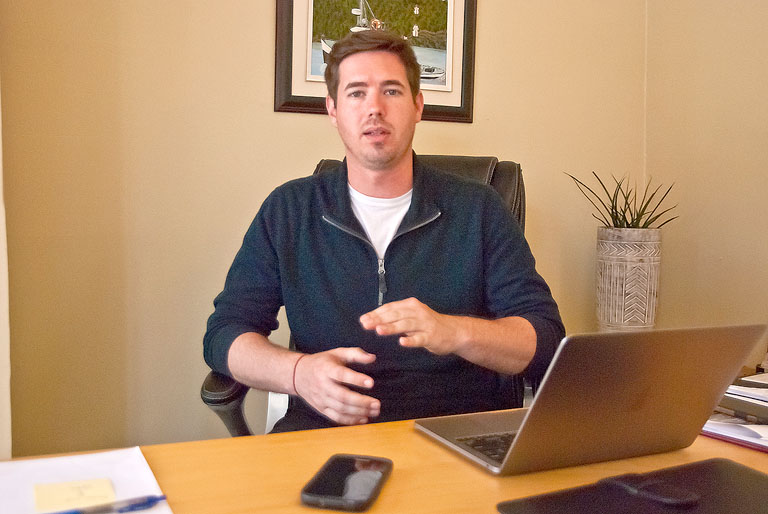
“My mom’s a teacher, everyone else is general contractors. I’ve worked for my step-dad and he does everything under the sun. We build houses together; framing, plumbing, electrical work, flooring, drywall, painting, concrete stuff, I’ve built garages, all that stuff.”
“I’ve had to work really hard to save money to do it. I’m pretty grateful for the work opportunities they gave me, but also the skills that I’ve learned because I can dissect government policy with extreme accuracy, but I can also install a bathtub and put new tiles down.”
But why run now? And why the Liberal Party?
“I decided to run because my specialty at school has been dissecting social and economic policy and their impacts on low income, marginalized demographics. I spent the last 4 years complaining to everyone who would listen about how the Ford government’s policies are incredibly regressive, they’re incredibly dangerous, they impact people’s lives in such a negative way. People that are seeking adequate healthcare, people that want decent education, people that want to see their environments protected all that stuff is at risk with these policies. I’ve been talking smack to all my friends about this and the opportunity came up and the election was coming up and a few of my friends said, ‘well, why don’t you run?’”
“I was intrigued about the Liberal Party because it’s like a start up from the ground up. They were reduced (to 7 seats) in the last election. It was an opportunity for me to help influence policy and to start in an area where I was able to be really impactful.”
“The last month or so I’ve been going over policy proposals from the Liberal Party and I was really excited about the environmental protection proposals. Reducing phosphorous in Lake Simcoe, the transit programs they want to expand. I was really excited about that – and, I’m working on this right now, is ensuring post secondary education is a little bit more accessible. I’d like to see OSAP be expanded so low income students can go to school and be able to finish their degrees and diplomas. When OSAP was cut by the Ford government, I had friends who I went to Lakehead with who are like, ‘I can’t afford to go to school anymore.’ So they have half a degree. What’s the point of that?”
Until joining the red team, Hiltz was an equal opportunity idea guy.
“I’ve actually worked with a lot of other parties. I’ve helped suggest policy initiatives to the NDP, Green, Conservatives – they’ve never taken any of my considerations seriously. I haven’t, per se, volunteered with a campaign before. I’ve just provided policy suggestions and I’ve done that for every party, but this is my first actual campaign experience. I’m learning a lot as I go.”
Healthcare
Each Candidate was specifically asked – does privatization make healthcare better? as a starting point.
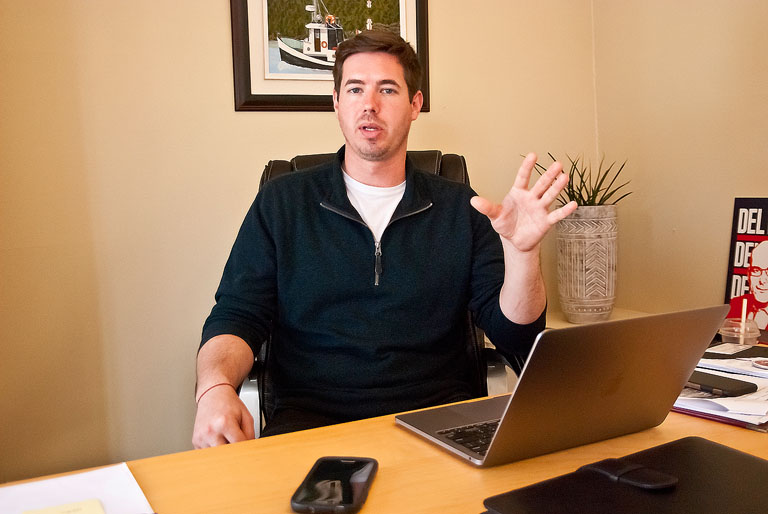
“No, absolutely, unequivocally no. When you take public funds and put them into private healthcare systems it reduces the existing infrastructure of public systems, so it’s not good. If you are incredibly wealthy then you can access private healthcare, but if you are like the majority of us and you are not incredibly wealthy, then you need to access public healthcare. Public healthcare is already under attack by the Conservative government, has been ever since way back to 1995, and it’s been incredibly detrimental to society as a whole. If we want to have equitable access to healthcare, then we need to ensure our pubic systems are strong and the Conservatives are unwilling to do this. They want to download those costs onto individuals rather than doing it themselves,” Hiltz said.
The government has made its intent to privatize some healthcare service and one wonders why anybody should get to profit from another’s medical misery.
“That’s’ another thing. Cabinet have already mentioned private hospitals. They say those words – we need private hospitals. So you go and access healthcare with your credit card instead of your OHIP card.”
Shades of the American system where people won’t even get into an ambulance because they can’t afford the cost.
“That’s messed up. You want to bring that to Canada? Our healthcare system is supposed to be our crown jewel. It does have cracks, People do fall through the cracks, there are issues with it, but we need to expand it to deal with that, not cut it completely.”
There is also widespread job dissatisfaction among medical professionals and mnay are leaving their jobs behind.
“That’s Bill 124. Those are the conditions Bill 124 created – and in the middle of a pandemic. I was talking to a friend last night who has been a nurse for 5 years and she works at RVH. She said it’s like going into a ghost town. Nobody wants to work there anymore. A lot of her friends have left for the private staffing industry and they work for these private companies that ship them all over Canada. They have their travel paid for. They make significantly more money. They get to choose their hours so they are not working 16 hours shifts and they get to come home when they are done,” Said Hiltz. And OHIP still pays for it.
So what would a Liberal government, do to fix this?
“I think it’s kind of a two pronged issue. We have to make sure we have the funding there to find those efficiencies and to help find a model that works best for everyone. Nurses have to be able to want to work there, or else the hospitals are going to be empty. You can put as many beds anywhere you want, you could put 1,000 beds in one of these hospitals, nobody’s going to attend to them.”
“Reviewing Bill 124 is an absolute priority, making sure that those nurses and those healthcare workers who have fought for us, front lines, during one of the worst pandemics of the last hundred years are treated with respect and with dignity and then they will begin to return. Right now they don’t want to be around. They don’t feel respected. They are working in terrible conditions.”
In keeping with the profiles of the other candidates, SUNonline/Orillia asked Hiltz for his position on abortion.
“I’m not pro or anti abortion, I’m just pro choice, its women’s choice. I don’t think men should have any say in the matter whatsoever. And obviously we want people to access them safely because if they’re not getting them safely, then they are getting them somewhere else.”
“They’re making personal health decisions and they should be able to access the resources they need to make personal health decisions without it being restricted.”
Housing
Also in keeping with this series of candidate profiles, Hiltz was also asked the same starter question – why should corporations be allowed to own so much of rental stock (30% in many larger cities) and control prices?
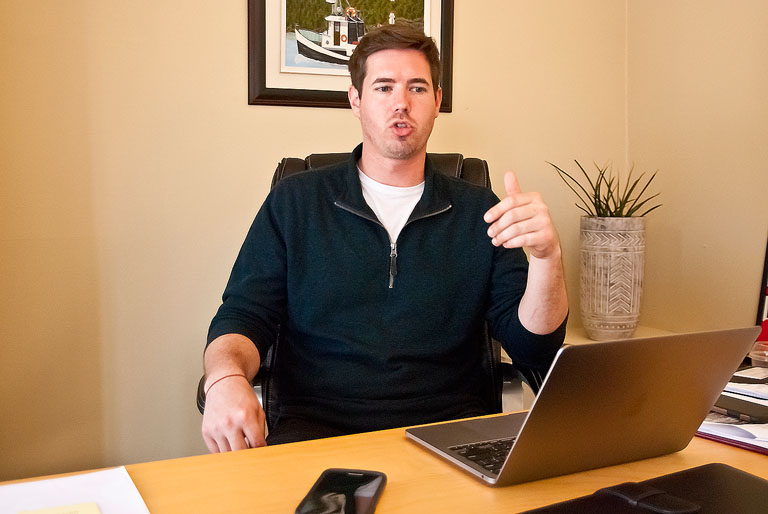
“It’s the first time in my life there’s bidding wars on rental properties. I used to live just up the street from this office. I was there for first and second year of university and it was $850. That same apartment when I last checked went up to $1,600 in a two year span.” Owned by a company? “It is owned by a company”
“These land speculators, landowners, as soon as they realize their building is worth a lot more now, they find all these backdoor reasons to kick people out. ‘Oh, we’re doing renovations,’ and then they just change the floor and paint the wall and then they are allowed to up their prices.”
“Or these speculators because there’s the one year capital gains tax, if you get rid of your property within one year of buying it, so they hold it for one or two years and then sell it. It’s all profit driven. Should we be profiting off this. We need more affordable housing. We can work in partnership with the federal government and the municipalities in order to do that.”
This results from a decades-long repositioning of changing the notion of having a home into having quasi bank accounts.
“Landlords who run two properties and have 5 tenants are not the issue.”
“Those corporations bring money from out of town, buying up all these small plots of land and somebody from North Bay, someone who wants to build their house for their family can’t compete with a corporation.”
“We need limitations on how much property they can own. We need limitations on how long they’re able to sit on plots of land. The Conservatives seem to think fixing the housing crisis means building more subdivisions. The reality is those homes are still going for $750,000 to $800,000 dollars. That’s not a solution to the problem.”
“My generation is dealing with this. We’ve been sold a lie. Work hard, get a good job, save your down payment, which used to be 30,000 to $40,000, which is now $100,000, $120,000, $130,000 and enter home ownership, raise a family wherever you want. It’s just not a reflection of reality.”
Work and Social Assistance
Again, a starter question kicked off discussion with each candidate – why is it OK for some Ontarians to live below the poverty line?

“It’s not OK for anyone to live below the poverty line. We are a 21st Century state. We are incredibly wealthy. The corporations that operate within these boundaries are incredibly wealthy. The new jobs being added the Conservatives tout all the time are low paying jobs, no benefits. People are starting to wake up to that and they’re leaving. They’re choosing not to work for these companies and those terrible conditions, but they’re also just leaving. They’re going to New Brunswick, they’re going to British Columbia, they’re going to other areas where they know they have a better shot. A lot of my friends have started their own businesses. What was a side hustle through the pandemic is now a fully fledged operation.”
“Myself and a lot of people I work with would like to see living wages instituted in different regions because we know that a living wage in Toronto is much different than a living wage here in Orillia, or in Midland. So wages absolutely need to come up. The provincial government needs to work with small businesses to be able to do that. Small businesses were screwed over the course of the pandemic. Mega corporations like Walmart and Costco raked in record profits, so now there’s an even bigger divide between small business and mega corporations.”
In the 1950s and 60s small business, many small businesses, existed alongside corporations and everyone made reasonable profits – until the loopy idea of Trickle Down Economics took hold and only big, regulation free business beholding to no one became the standard
“We were sold a lie essentially. We know that small business is the heart of our local economies. Money that is made locally is often spent locally, it goes towards kid’s sports teams, it goes towards charitable causes, so it’s really important we have those systems built up and strong. We need to fight the big corporations that are coming in and taking over our local economies and allow smaller businesses to flourish, to grow, to be able to hire more people because that money stays local and it helps everyone.”
Today big corporations believe it’s their right and obligation to dump their responsibilities for their employees onto the public purse – and it’s only going to get worse when the last employee walks out the door, having been replaced by a machine. Government has its head in the sand hoping the research into employment trends is wrong – except we can see it in motion all around us. What will become of the mass of unemployed?
“The Liberals started that pilot project about UBI. If you look at the data from it, people aren’t doing nothing with their money. They were getting dental work done, they were funding new job opportunities. It was great for those communities. They were going back to school . They were experiencing a higher quality of life with that program.”
“They say handout, but there’s a difference between addressing poverty and policing poverty. They criminalized poverty. Where do you want to put your money? Do you want to put it toward personal development and development of people and communities? Or do you want to put it towards the criminalization of these people. It’s a trade off. You’re either going to help these people grow and help them change their lives, or you’re going to heavily police them. It’s going to cost the same amount of money. What do you want to do?”
There is no mystery how to pay for universal benefits, experts have already looked at this from every angle and concluded if companies can shed an expense, workers, and shift the cost of keeping those people onto the public treasury, then they should, and can pay something for their action out of windfall profits.
“We live in a global market, so goods that come from other parts of the world that are dealing with humanitarian crisis’s, have low wages; we’re not going to be able to compete with those industries. So if China, for example, is going to continue to send goods over here that are in direct competition with local producers then we need to tax them so we can be competitive. And Ontario has a role to play in that.”
“We’re at another pivotal time. We can plan for the future and its reality, or we can ignore it and more and more people are going to fall into poverty. So, yeah, tax these mega corporations that are laying people off.”
“We have the tools to deal with these problems. We need the political will to utilize them. I grew up in poverty. I understand these things. Now I’m in a position where I can advocate on the eradication of poverty, I’m going to do it tooth and nail.”
Public Discourse
Civilization has become very uncivil the last 5 or ten years. It all starts with someone typing on a computer keyboard – and then social media companies spread misinformation and hate like they are obligated to, and then media companies salivate over ad revenue if they can make a clickbait headline out of it all. It has spread from just being on the internet to real life. Government, in trying to be seen to be acting, is again not listening to those who know how information spreads on the internet, which is causing many people to concerned about free speech.

“This is a tough one because we do have hate speech law in Canada already. For the most part, we should be able to say anything outside of fire in a crowded room. Things are changing and hate speech has a direct impact on people’s lives. Hate speech can instigate violence. It can cause social unrest. We’re seeing this already here. Earlier today myself, Elizabeth Van Houtte, Mark Douris, all of our signs are being damaged. I spoke to my grandmother, she’s like, ‘Oh I’m really disappointed that Trump style politics has come into Canada,’ where he gave large groups of people permission to say and do hurtful and dangerous things.”
“The front of my house was vandalized the other day. Somebody came onto my property, destroyed my property, ripped the sign out of the ground, threw it onto the road and caused significant property damage to my home. I live there with my girlfriend. I signed up for this. I’m ready to deal with these kinds of things, but she didn’t. She didn’t sign up for any of that and that is what annoys me the most about it. Now she’s asking the questions, ‘How often is this going to happen? Is this what you want to do for a career? Are we going to be subjected to violence?’” Hiltz said.
“In the United States a lot of that right wing philosophy is tied to these white supremacist groups that are going out and doing violent acts. Spewing misinformation and hate online is a problem. I think we need to address that in a way that conforms with speech laws we have. I can never say I’m going to limit free speech because that’s not what I believe. If you’re inciting violence or putting people in danger that’s a completely different scenario and that needs to be looked at very carefully. It’s important to acknowledge there are social ramifications for this behavior.”
Highways Or Public Transit?
Does spending billions on four major highway construction projects make sense? The argument given for doing this is flatly rejected by those who know anything about how highways work – and then there’s the environment angle, taking farm land we may likely and desperately need in coming years and paving over it. Shouldn’t the same money be spent on public transit?
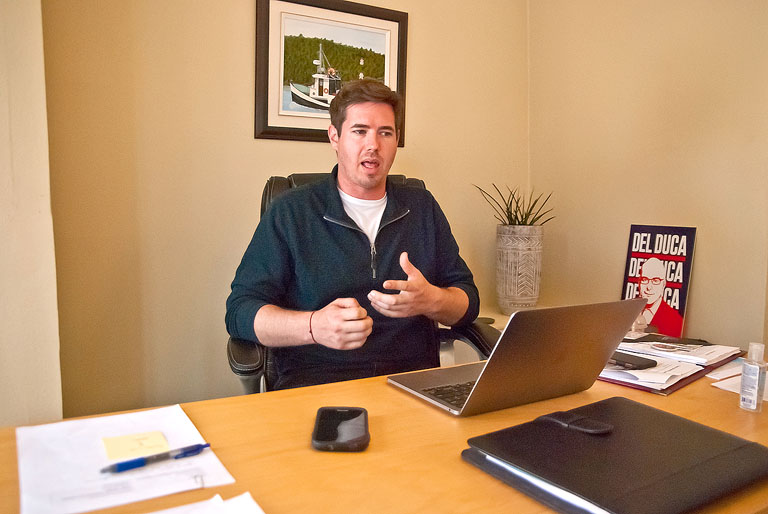
“That is one of the staples of our policy around climate. $1 fare all across the region. That applies to Ontario Northland, municipal transit, Go Transit. Cancelling the Bradford Bypass is something I’m going to be really happy to support. Also, trying to tackle emissions problems in a way that benefits everyone. We can provide a little bit of funding to help people buy electric vehicles, but that only helps people who can buy electric vehicles, so we have to also invest heavily into our transit infrastructure. I’ve used the busses here, I’ve used them in Midland, I’ve used Ontario Northland, for that (fares) to be significantly reduced that would help a lot of people.”
We are so far behind the times with public transit, connecting from one system to the next might happen, your transportation might leave or arrive at a time that works, and it might not eat up all the rent money.
“I think people are going to use transit as long as it works for them. We have these skeleton structures in place and people are like, ‘Oh whatever,’ pay $3 and not use it very often.”
“We need to develop them to be reliable and efficient and more people will use those systems. If we can do the same thing with Ontario Northland, if we can do the same thing with municipal transit, more people will use them.”
Aside from obvious monetary considerations, is the equally obvious benefit of fighting climate change investing in public transit will have. There are other environment issues the Liberal Party has on its radar.
“The protection of pristine environments is really important. We want to designate 30% of all landmass in Ontario to be protected. We want to expand the Greenbelt into Simcoe County, 5 new provincial parks will be absolutely great, stopping the Bradford Bypass from going through the Greenbelt, that’s just an egregious attack on the environment, which is going to have a lot more salinization, a lot more phosphorous into Lake Simcoe.
“We’re already dealing with those problems. 800 million new trees we want to plant, which is amazing. Yes we still want to reduce emissions, but we still need the carbon sinks to help us with that. All of these approaches need to be multi-facetted. The Alliston Aquifer – I’ve been working with a few groups around there for the past few weeks, listening to the hydrologists and reading the reports about how it’s the gold standard for water on the planet and absolutely needs to be protected. Right now it’s at risk from aggregate mining looking for expansion. I was taken on a tour of a lot of that area in Tiny and you can see where the natural springs are, you walk up to them and they are just a puddle of silt and water is trickling. There are obviously natural and environmental implications. It has to be protected”
The Last Word
As always, candidates get the opportunity to talk about their burning issue. Hiltz is immersed in the education system right now, so it makes sense he’s got some ideas on that.

“Education spending has been really bad. I think if you want a middle class job, the market has changed so much where it requires some form of post secondary education, whether it be a certificate program, a degree, or diploma, through trades; that spending has been cut so badly and limited to folks who already have money. If I wasn’t adopted I would have had no chance to go to university. I was able to apply for OSAP and I got some help from my parents and I’m able to do things that really affect the social and economic development of my community. Because of that and I’m really grateful for those opportunities. But for students that come after me, I’m lucky that I’m finishing and not starting now.”
“We have an MPP in Jill Dunlop who is the minister of colleges and universities and is happily cutting OSAP, happily cutting funding. They do it for 3 years and 11 months they cut funding to crucial institutions and for one month they give some piecemeal reforms back, Here’s a cookie, we’re helping you, and they think we are dumb enough to not pay attention to the past 3 years and 11 months. Our publicly funded post secondary institutions are not publicly funded anymore, they are publicly assisted, about a third of their revenue comes from the province, the rest of it comes from hikes in tuition for domestic students and international students.”
(Photos by Swartz – SUNonline/Orillia) Main: Simcoe North Ontario Liberal Party candidate Aaron Cayden Hiltz
Other Candidate Profiles:


